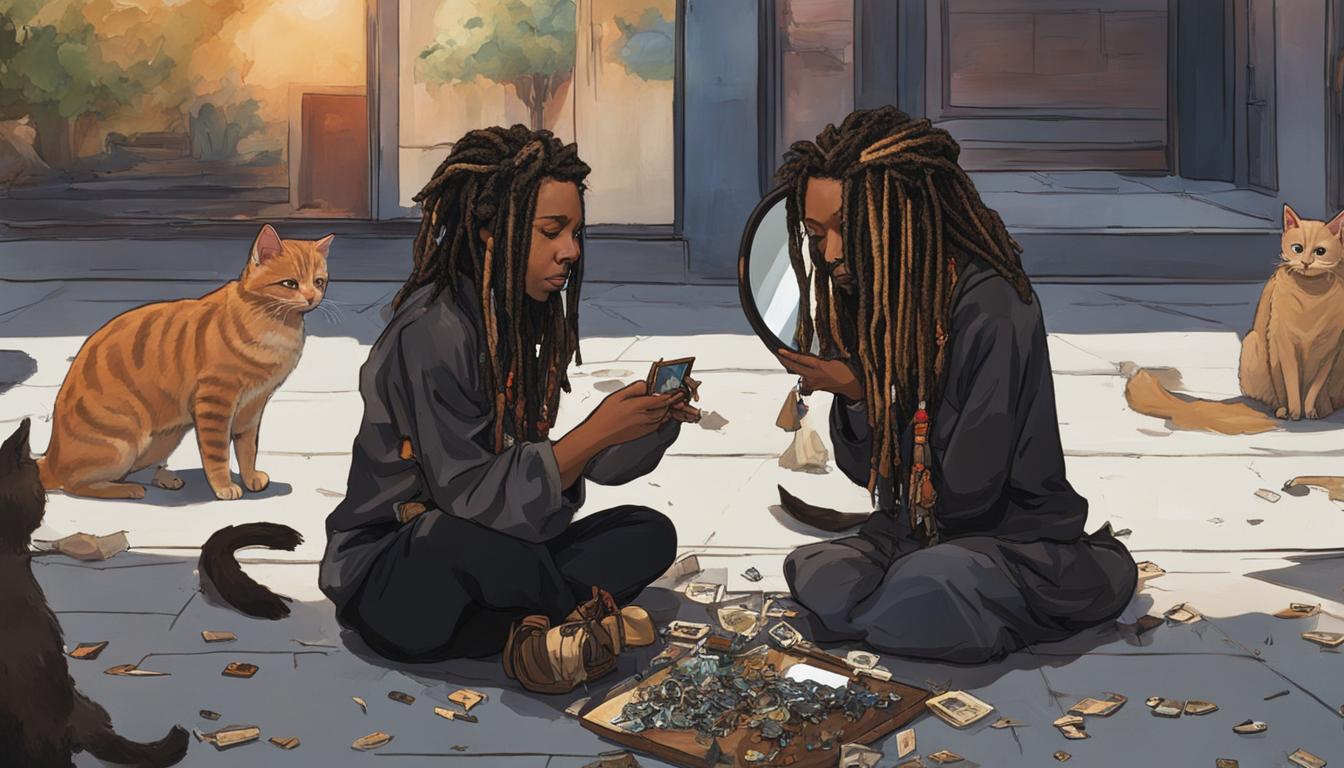Dreadlocks, also known as dreads or locs, are rope-like strands of hair formed by matting, either naturally or through twisting. They have a rich history and cultural significance, dating back to ancient civilizations like Egypt and Ethiopia. Locs hold deep spiritual meaning for many individuals and communities, but there are also superstitions and myths surrounding them.
In this article, we will debunk the myth that counting your locs brings bad luck and explore the historical and cultural significance of locs. We will also discuss the practice of counting locs, proper care and maintenance, the spiritual connection to locs, avoiding misconceptions, and the future of locs in society. Let’s dive in and separate fact from fiction when it comes to these beautiful and meaningful hairstyles.
Key Takeaways:
- Counting your locs is a personal choice and does not bring bad luck.
- Locs have a long history and cultural significance, with different beliefs across various cultures.
- Proper care and maintenance are essential for healthy and neat-looking locs.
- For many individuals, locs hold a deep spiritual connection and offer a source of empowerment.
- Understanding and respecting the cultural context of locs is crucial in promoting inclusivity and challenging stereotypes.
The History and Cultural Significance of Locs
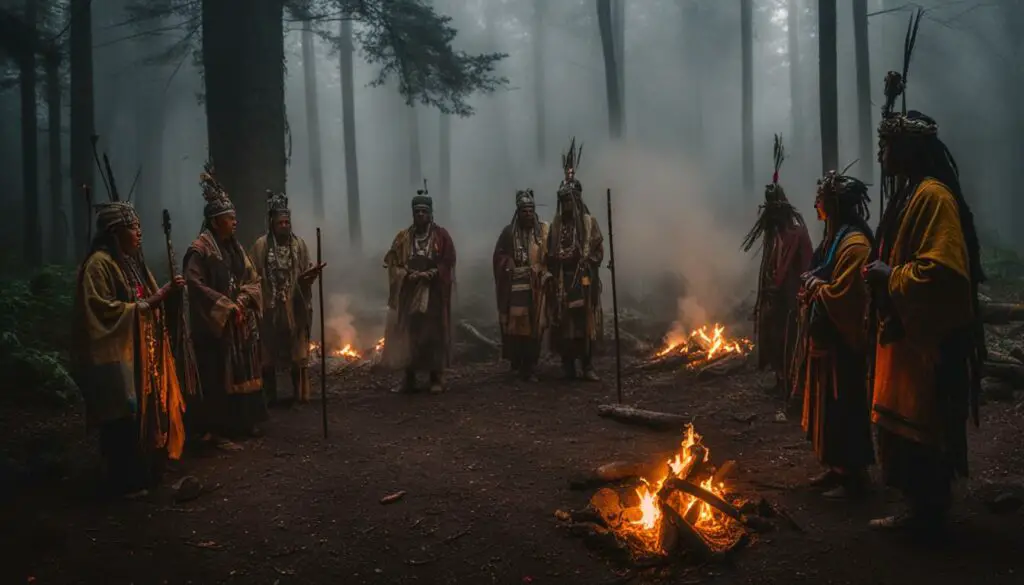
Locs, also known as dreadlocks, have a rich history spanning different cultures and time periods. From ancient Egypt to the Rastafarian movement, locs hold deep cultural and spiritual significance in various societies.
“Locs represent power and esteem.”
In ancient Egypt, locs were more than just a hairstyle; they symbolized power and esteem. Egyptians believed that locs acted as a way to channel spiritual energy and connect with higher realms.
“Ethiopian tribes believed that locs acted as antennas for mental energies and physical strength.”
The cultural beliefs surrounding locs extended beyond Egypt. In Ethiopia, tribes believed that locs acted as antennas, enhancing mental energies and physical strength. This connection between locs and spiritual energy underscores their revered status in Ethiopian culture.
“Shiva, a deity in Hindu culture, was depicted with twisted locs.”
In Hindu culture, the deity Shiva is often portrayed with twisted locs. Many of his followers have adopted locs as a spiritual commitment, emulating Shiva’s divine presence and teachings.
“Rastafarians view locs as a symbol of the Nazarite vow and connect them to the Lion of Judah.”
Rastafarians, a religious and social movement, consider locs as a symbol of the Nazarite vow, emphasizing purity and dedication to their beliefs. They also associate locs with the Lion of Judah, representing Emperor Haile Selassie I of Ethiopia, who is regarded as a messianic figure.
“Locs have been a means of preserving spiritual energy across various cultures.”
These examples highlight how locs have been a means of preserving spiritual energy and embracing cultural beliefs across different societies. From ancient Egypt to Rastafarianism, the cultural significance of locs runs deep.
The Cultural Significance of Locs
Locs represent more than just a hairstyle; they embody cultural heritage, identity, and spiritual connections. Throughout history, individuals and communities have celebrated the spiritual and cultural importance of locs, recognizing their role in connecting with higher realms and preserving ancient traditions.
| Ancient Egypt | Ethiopia | Rastafarian Movement |
|---|---|---|
| Symbolized power and esteem | Acted as antennas for mental energies and physical strength | Represented the Nazarite vow and Lion of Judah |
These cultural beliefs and practices surrounding locs have contributed to their continued significance and popularity among individuals seeking a deeper connection to their roots and spirituality.
Stay tuned for the next section, where we will explore the practice of counting locs and the superstitions associated with it.
The Practice of Counting Locs
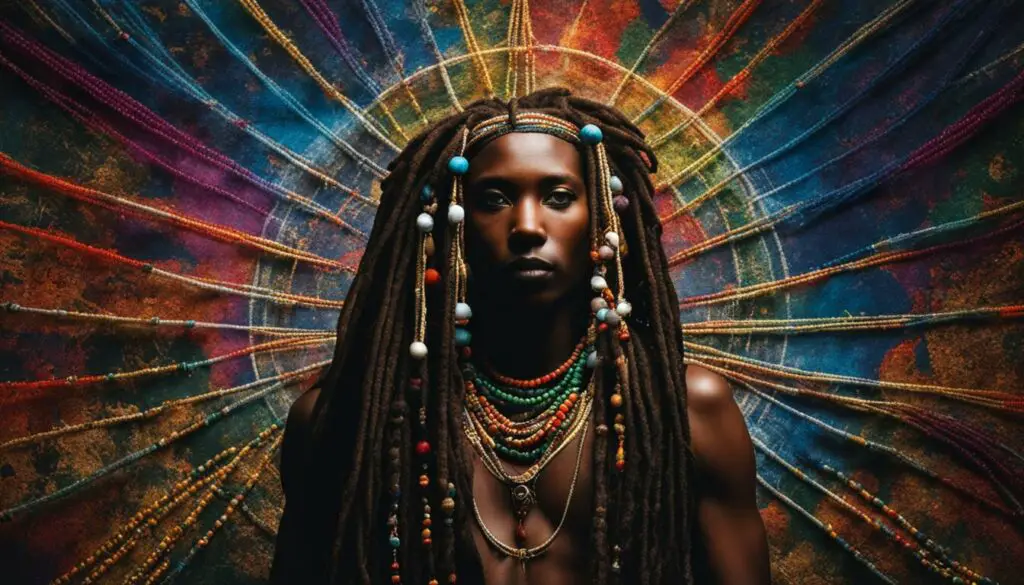
Some individuals hold the belief that counting their locs brings bad luck. This belief is rooted in cultural superstitions and spiritual beliefs associated with counting dreadlocks. However, it is important to note that there is no factual basis for the notion that counting locs has any negative impact.
Counting locs is a personal choice that varies among individuals and cultures. While some may believe in the superstition, others do not associate any negative consequences with counting their locs. It is crucial to respect and understand these diverse beliefs and recognize that personal experiences and cultural backgrounds shape individual perspectives on counting dreadlocks.
There is no inherent harm in counting locs, and it should not be associated with any superstitions or negative outcomes. Each person’s journey with their locs is unique, and counting them can be a way of tracking growth and progress. It is essential to embrace personal choices regarding locs and celebrate the individuality and diversity that come with different beliefs and practices.
Dispelling Myths and Embracing Personal Choice
There is no factual basis for the belief that counting locs brings bad luck.
Counting locs has no inherent negative consequences and should not be misconstrued as a superstition. Embracing personal choice allows individuals to express their unique journey with their locs and celebrate the diversity within loc-wearing communities. By dispelling myths and understanding the cultural significance and spiritual beliefs associated with locs, we can foster an environment of inclusivity and respect.
Proper Care and Maintenance of Locs
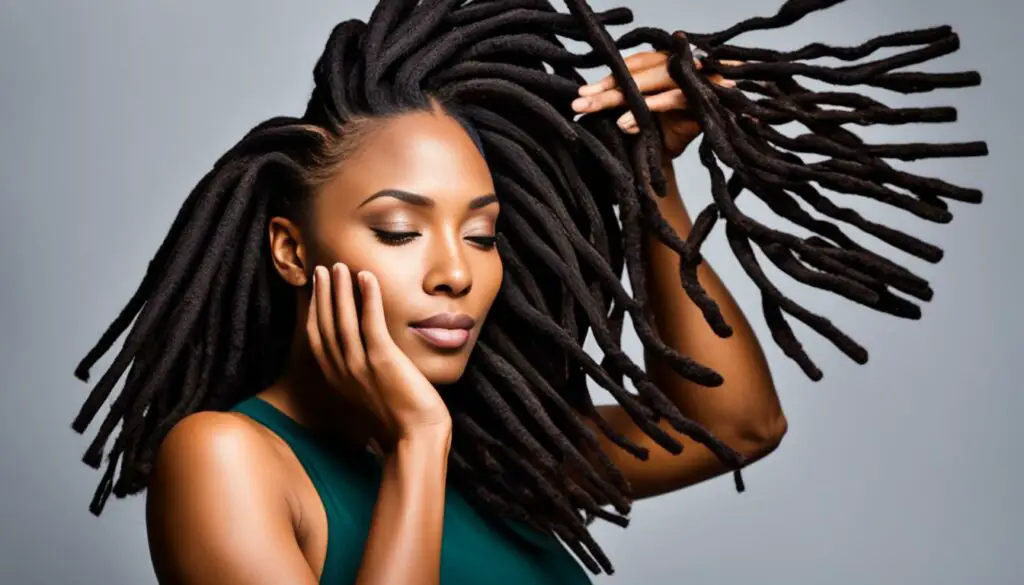
Maintaining locs requires regular care and attention to ensure they stay healthy and looking their best. Proper care not only promotes hair growth but also prevents damage and breakage. Here are some tips to help you maintain your locs and avoid common pitfalls:
How Often to Re-do Locs
The frequency of re-twisting or re-doing your locs depends on various factors, including your hair type and personal preference. Some people prefer to re-twist their locs every 4-6 weeks, while others may go up to 10 weeks before retouching. It’s important to find a schedule that works for you and your hair’s needs. Regular maintenance will help prevent your locs from becoming too loose or frizzy.
Tips for Re-twisting Locs
When re-twisting your locs, it’s crucial to take a gentle and careful approach to avoid causing damage. Here are some tips to keep in mind:
- Start with clean locs: Make sure your locs are clean and free from product buildup before re-twisting. This will help the new twists hold better and maintain their shape.
- Avoid re-twisting dry hair: It’s important to moisturize your locs before re-twisting to prevent breakage and discomfort. Applying a lightweight oil or moisturizer can help soften the hair and make the process easier.
- Separate merged locs gently: Over time, locs may start to merge or stick together. When re-twisting, take the time to gently separate any merged locs to maintain an even and neat appearance.
- Avoid pulling too tightly: When re-twisting, be careful not to pull your hair too tightly, especially around the hairline. Tight twists can cause tension and lead to thinning or breakage.
- Consider using a locking gel or cream: Some people find that using a locking gel or cream helps their twists stay in place for longer periods. Experiment with different products to find one that works well for your hair type.
Remember, everyone’s hair is unique, so it’s essential to find the right technique and products that work for you. If you’re unsure, consulting with a professional hairstylist who specializes in locs can provide personalized advice and recommendations.
Avoiding Damage to Locs
To keep your locs looking healthy and prevent damage, consider the following tips:
- Avoid excessive manipulation: Overstyling or constantly touching your locs can lead to breakage. Minimize excessive manipulation and allow your locs to naturally form and mature.
- Protect your locs at night: Wearing a satin bonnet or scarf can help protect your locs while you sleep. This prevents friction against pillowcases and helps maintain the shape and neatness of your locs.
- Moisturize regularly: Hydrating your locs is essential to prevent dryness and breakage. Use a moisturizing spray or oil to keep your locs hydrated without causing buildup.
- Avoid harsh chemicals: Be cautious with the products you use on your locs. Harsh chemicals, such as those found in certain shampoos or conditioners, can cause dryness and damage. Opt for natural and gentle hair care products instead.
By following these tips and maintaining a regular care routine, you can ensure that your locs stay healthy, strong, and vibrant for years to come.
The Spiritual Connection to Locs
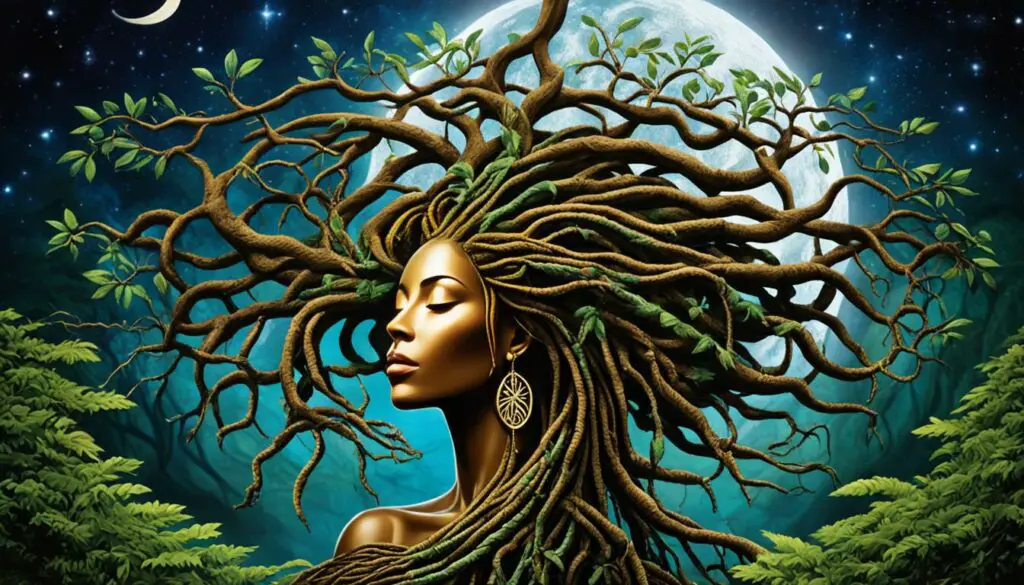
For many individuals, their locs hold a deep spiritual significance. Some believe that locs act as a gateway for spiritual energies, keeping them within the body and enhancing physical strength. Taking extra care and attention to locs can create a heightened meditative state. The ancient civilizations of Egypt, Ethiopia, and other tribes were attuned to the spiritual power of locs. The decision to have locs can be a personal and spiritual choice, offering inspiration and connection to ancient beliefs.
“Having locs is like having a direct link to my ancestral roots. It’s a way for me to tap into the spiritual energy of my ancestors and feel their presence guiding me.”
The spirituality of locs goes beyond a mere hairstyle. Locs are seen as a source of power and a way to connect with something greater. People who embrace locs often feel a strong sense of connection with their cultural heritage, ancestry, and the wisdom of their predecessors.
By nurturing and caring for their locs, individuals can cultivate a deeper spiritual connection. The act of washing, moisturizing, and twisting locs can become a ritual that allows individuals to center themselves and find inner peace.
Unlocking Inner Strength with Locs
Throughout history, locs have been associated with strength, resilience, and spiritual power. Many cultures believe that locs act as a physical representation of the spiritual energy within individuals. The decision to wear locs can be emblematic of embracing one’s inner strength and harnessing the power that lies within.
Just as the ancients recognized the spiritual significance of locs, modern-day individuals find empowerment in their journey with locs. By choosing to wear locs, individuals can assert their identity, challenge societal norms, and create a visual testament to their personal growth and transformation.
Connecting to Ancient Beliefs
The spiritual connection to locs transcends time and cultural boundaries. Locs have been adorned by individuals in ancient civilizations such as Egypt and Ethiopia, where they were revered for their spiritual symbolism and connection to higher realms.
Embracing locs allows individuals to connect with the ancient beliefs and traditions of these cultures. It becomes a way to honor and pay tribute to the wisdom and spirituality of those who came before.
| Ancient Cultures | Spiritual Significance |
|---|---|
| Egypt | Symbol of power and esteem |
| Ethiopia | Act as antennas for mental energies and physical strength |
| India (Hindu culture) | Associated with deities like Shiva |
| Rastafarianism | Symbol of the Nazarite vow and connection to the Lion of Judah |
Embracing the spirituality of locs is a personal journey that allows individuals to tap into a powerful source of inner strength, cultural heritage, and ancient wisdom. By honoring the spiritual significance of locs, individuals can find a deep connection and embrace their true selves.
Avoiding Misinterpretations and Misconceptions
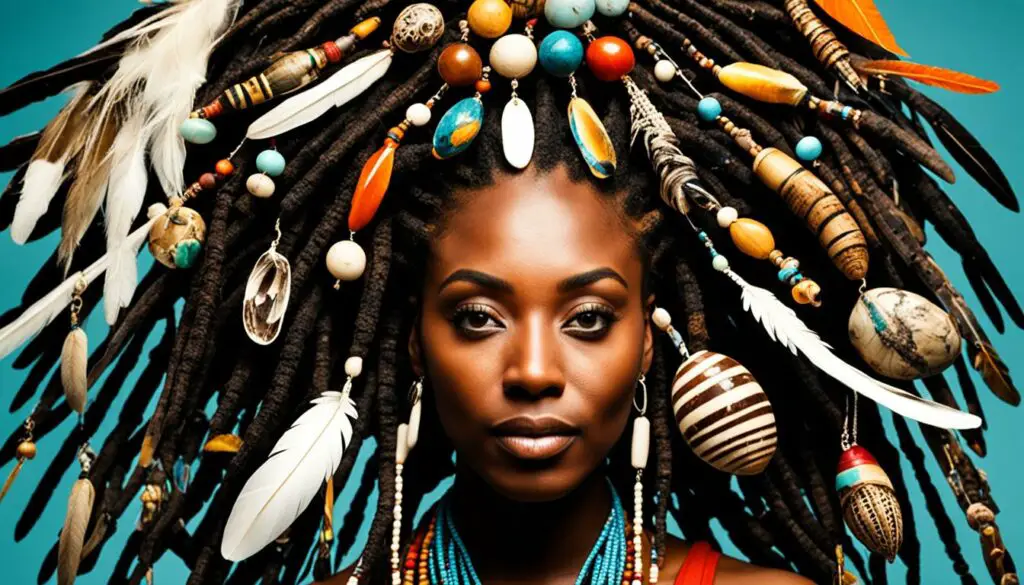
When discussing locs, it is crucial to avoid misinterpretations and misconceptions. These misunderstandings can undermine the cultural and spiritual significance of locs, reducing them to mere fashion trends. It is important to recognize and respect the deep-rooted meaning behind locs as an expression of identity and belief.
Cultural sensitivity is key in understanding and appreciating the significance of locs. Locs have historical and spiritual importance for many individuals and communities. By recognizing their cultural context and refraining from generalizations, we can foster inclusivity and appreciation for diverse hairstyles.
“Locs are more than just a hairstyle. They are a way for individuals to connect with their heritage, spirituality, and personal journey.”
Recognizing the misconceptions about locs is essential in promoting understanding and dismantling stereotypes. Locs should not be associated with negative beliefs or superstitions. Each person’s decision to have locs is unique and should be respected as an important aspect of their self-expression.
Dispelling Common Misconceptions
- Misconception 1: Locs are dirty or unkempt hairstyles.
Locs require regular maintenance and care, just like any other hairstyle. Cleanliness and hygiene are essential in maintaining healthy locs. - Misconception 2: Locs are unprofessional.
Locs, like any other hairstyle, do not determine a person’s professionalism. It is the individual’s skills, abilities, and character that truly matter in professional settings. - Misconception 3: Locs are only for a specific race or culture.
Locs are worn by individuals from various racial and cultural backgrounds. Appreciating the diversity of locs helps to break down stereotypes and embrace the inclusivity of this hairstyle.
By avoiding misinterpretations and misconceptions, we can create a space for meaningful discussions and appreciation of locs. It is important to approach the topic with cultural sensitivity and an open mind, recognizing the beauty and significance of locs in various communities.
| Common Misconceptions about Locs | Correct Understanding |
|---|---|
| Locs are dirty or unkempt hairstyles | Locs require regular maintenance and cleanliness, just like any other hairstyle. |
| Locs are unprofessional | Professionalism is not determined by hairstyle. It is based on skills, abilities, and character. |
| Locs are only for a specific race or culture | Locs are worn by individuals from diverse racial and cultural backgrounds. |
Image: A visual representation of the misconceptions surrounding locs. It is important to challenge these misunderstandings and embrace the true cultural and spiritual significance of locs.
The Historical Significance of Different Hairstyles
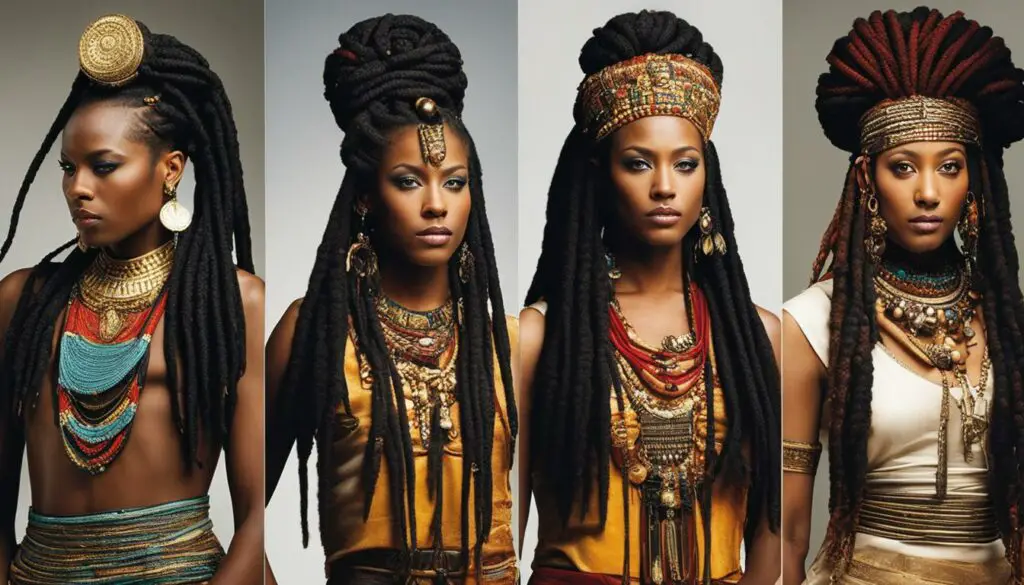
The history of dreadlocks traces back to ancient civilizations, offering a fascinating glimpse into the cultural and symbolic significance of hairstyles. From ancient Egypt to various European cultures, hairstyles have served as a reflection of social, spiritual, and individual identity.
Ancient Egypt: Locked Hairstyles and Wigs
Ancient Egypt is renowned for its elaborate and intricate hairstyles, including locked hairstyles and wigs. Bas-reliefs and archaeological discoveries provide evidence of the prevalence of dreadlocks in Egyptian society. These locked hairstyles were often adorned with intricate jewelry and accessories, emphasizing their aesthetic appeal.
Ancient Greece and Rome: Resemblance to Locs
While ancient Greeks and Romans had hairstyles that resembled dreadlocks, they were actually braids or plaits. These intricate braided styles were designed to emulate the textured appearance of dreadlocks. These hairstyles were popularized as a symbol of status, fashion, and cultural identity.
Vikings, Celts, and European Cultures: Distinct Hairstyles
Distinct from dreadlocks, the Vikings, Celts, and other European cultures had their own unique hairstyles. The Vikings, known for their warrior culture, often wore their hair long and braided. The Celts, on the other hand, favored intricate designs such as mohawks and elaborate braids. These diverse hairstyles were emblematic of cultural traditions and individual expression.
Understanding the historical context of different hairstyles allows us to appreciate the diversity and significance of locs. These hairstyles offer a glimpse into the rich tapestry of human history and the cultural bonds that connect us across civilizations.
Personal Choice and Empowerment
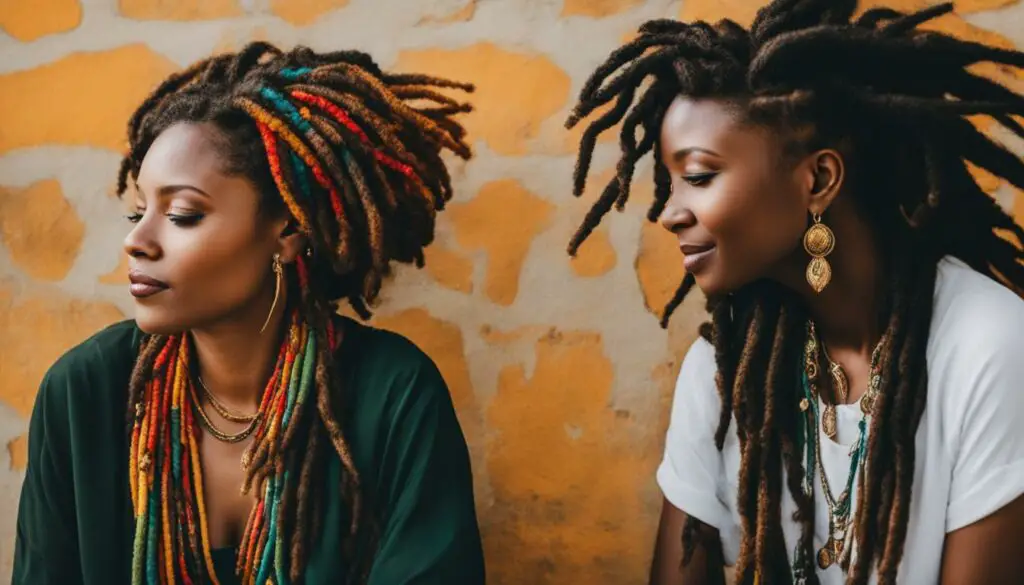
The decision to wear locs is a personal choice and an expression of individuality. By embracing locs, individuals can feel empowered and connected to their roots, culture, and spirituality. Locs offer a way to break free from societal norms and embrace a unique style. It is important to celebrate and respect personal choices regarding hair and recognize that each individual’s journey with locs is personal and meaningful.
There is a sense of empowerment that comes with choosing locs as a hairstyle. It allows individuals to reclaim their identity and defy beauty standards that may not align with their true selves. Locs have a rich history and hold deep cultural and spiritual significance, making them more than just a fashion statement.
“My locs symbolize my connection to my heritage and my pride in my identity. It’s not just about my hair; it’s about embracing who I am and where I come from.” – Maria Johnson
Locs provide a platform for self-expression, allowing individuals to showcase their creativity and personality. They can be styled in various ways, adorned with beads, ribbons, or colorful wraps, making every set of locs unique to the wearers. Each person’s loc journey is a testament to their personal story and growth.
Empowerment Through Locs
Locs have the power to instill confidence and a sense of self-worth. By embracing this natural hairstyle, individuals defy societal pressures and embrace their authentic selves. The journey of growing and maintaining locs can be transformative, fostering self-acceptance and inspiring personal growth.
The empowerment that comes with wearing locs extends beyond the individual. It sends a powerful message of embracing diversity and challenging beauty standards in society. Locs have a way of breaking down stereotypes and inspiring others to embrace their own unique identities.
Moreover, locs provide an opportunity for individuals to connect with their cultural heritage. Many cultures around the world have embraced locs as a symbol of pride, spirituality, and resilience. By wearing locs, individuals can honor and celebrate their cultural roots, fostering a deeper sense of connection and belonging.
Vibrant Hairstyles That Inspire
Locs offer endless possibilities for creativity and individual expression. Whether styled in intricate updos, cascading curls, or free-flowing strands, locs are a testament to the vibrant beauty and versatility of natural hair.
| Benefits of Wearing Locs | Examples |
|---|---|
| Low maintenance | – |
| Strengthens personal identity | – |
| Celebrates cultural heritage | – |
| Promotes self-love and acceptance | – |
| Fosters a sense of community | – |
Locs have inspired countless individuals to embrace their natural hair texture and celebrate their unique beauty. By wearing locs with pride, individuals pave the way for future generations to embrace their authentic selves.
The journey of embracing locs is not just about hairstyling, but a personal manifestation of empowerment, resilience, and cultural pride. It is a choice that enables individuals to embrace their true selves, express their creativity, and inspire others to do the same.
The Future of Locs
Over the years, there has been a significant shift in the way locs are perceived and accepted in society. No longer are locs solely seen as a rebellious or countercultural hairstyle; they have emerged as a powerful form of self-expression and cultural identity.
Locs hold a deep significance for individuals who choose to wear them, serving as a symbol of their heritage, spirituality, and personal journey. As society becomes more diverse and inclusive, there is a growing acceptance and celebration of different hairstyles, including locs.
The evolving perceptions of locs signify a broader shift in societal attitudes towards embracing and appreciating cultural diversity. People are recognizing that one’s choice of hairstyle should be respected and celebrated, instead of being met with prejudice or misconceptions.
It is essential to promote inclusivity and challenge the stereotypes surrounding locs and other natural hairstyles. By doing so, we can foster a society where individuals feel empowered to express themselves authentically and where cultural differences are embraced rather than shunned.
| Benefit | Description |
|---|---|
| Self-Expression | Locs provide a unique way for individuals to express their cultural heritage and personal journey through a hairstyle that holds deep significance. |
| Cultural Identity | Wearing locs allows individuals to embrace their cultural identity and exhibit pride in their heritage, contributing to a more diverse and inclusive society. |
| Inclusivity | The acceptance of locs signifies progress towards a society that celebrates and respects different hairstyles, promoting inclusivity for all. |
| Empowerment | By embracing locs, individuals can feel empowered and connected to their roots, culture and spirituality, asserting their identity without conforming to societal norms. |
Challenging Stereotypes
“Accepting locs as a valid and beautiful hairstyle is a step towards embracing diversity and challenging the stereotypes that have marginalized people with natural hair for far too long.” – Jasmine Thompson, Cultural Diversity Advocate
Acceptance and celebration of locs in society serve as a testament to our progressing understanding and appreciation of different cultural expressions. As we continue to evolve, it is essential to promote education and awareness about the significance of locs and other natural hairstyles.
By tearing down misconceptions and embracing the rich cultural heritage they represent, we can build a more inclusive and accepting society. Let us celebrate the future of locs as a powerful symbol of self-expression, cultural identity, and beauty.
Conclusion
In conclusion, the belief that it is bad luck to count your locs is a myth without any factual basis. Locs have a rich historical and cultural significance, dating back to ancient civilizations such as Egypt and Ethiopia. They have been embraced by various cultures as a symbol of power, spirituality, and cultural identity.
For many individuals, locs hold deep spiritual meaning and act as a gateway for spiritual energies. It is important to respect and appreciate the cultural and spiritual aspects of locs, recognizing the diversity of beliefs and practices associated with them.
The practice of counting locs is a personal choice and should not be associated with superstitions or negative beliefs. Each individual’s journey with locs is unique and should be celebrated. By understanding and embracing the cultural and spiritual significance of locs, we can foster inclusivity and respect for diverse hairstyles and expressions of identity.
FAQ
Is it bad luck to count your locs?
No, there is no factual basis for the belief that counting locs brings bad luck. It is simply a superstition stemming from cultural beliefs and spiritual traditions.
What is the cultural significance of locs?
Locs have a deep cultural significance, dating back to ancient civilizations like Egypt and Ethiopia. They have been associated with power, spirituality, and identity in various cultures throughout history.
Why do some people believe counting their locs is bad luck?
The belief that counting locs is bad luck is based on cultural superstitions and spiritual beliefs. However, there is no factual basis for this belief.
How often should I re-do my locs?
The frequency of re-doing locs depends on personal preference and hair type. Some hairstylists recommend re-twisting or re-doing locs every 4-6 weeks, while others go up to 10 weeks.
What is the spiritual connection to locs?
For many individuals, locs hold a deep spiritual significance. Some believe that locs act as gateways for spiritual energies, enhancing physical strength and creating a heightened meditative state.
How should I care for my locs to avoid damage?
It is important to gently re-twist locs, avoiding pulling too tightly, especially at the hairline. Regular maintenance, such as wearing a bonnet or scarf, can help keep locs looking neat and prevent breakage.
What are some common misconceptions about locs?
Some common misconceptions about locs include associating them with laziness or unprofessionalism. It is important to recognize their cultural and historical significance, as well as respect personal choices regarding hairstyles.
What is the historical significance of different hairstyles?
Locs have a rich history dating back to ancient civilizations. They can be traced to ancient Egypt, Ethiopia, and other cultures. Understanding the historical context of different hairstyles helps appreciate their diversity and cultural significance.
Why is wearing locs considered a personal choice and empowerment?
Wearing locs is a personal choice and an expression of individuality. It allows individuals to feel empowered and connected to their roots, culture, and spirituality. Locs offer a way to break free from societal norms and embrace a unique style.
How are perceptions of locs changing in society?
Over the years, perceptions of locs have evolved, and they are increasingly accepted in society. Locs are now seen as a form of self-expression and cultural identity, rather than a rebellious or countercultural hairstyle.
